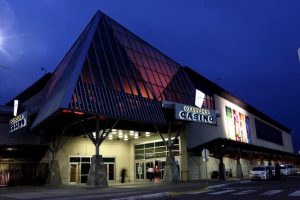 MoveUP, a workers union representing members at public and private sector companies in Western Canada, has provided surveillance employees at the Cascades Casino in Langley with union certification. The step is considered part of the largest major trend in the gambling sector of British Columbia, where workers unions have gained popularity in the casino industry, despite they have been facing certain difficulties in other business areas.
MoveUP, a workers union representing members at public and private sector companies in Western Canada, has provided surveillance employees at the Cascades Casino in Langley with union certification. The step is considered part of the largest major trend in the gambling sector of British Columbia, where workers unions have gained popularity in the casino industry, despite they have been facing certain difficulties in other business areas.
The certification of the Cascades Casino follows the Coquitlam-based Hard Rock Casino’s two-month workers strike. Eventually, the latter was brought to an end with the ratification of the first collective agreement between the Great Canadian Gaming Corporation and the casino workers’ representatives. A narrow majority of the members of 400 British Columbia Government and Service Employees Union (BCGEU) gave the nod to the agreement, which provided them with the desire wage increase.
The employees of the Hard Rock casino became members of a worker union a couple of years ago. Since then, a trend of a sharp increase in both the number and proportion of casino industry employees becoming union members has been registered in the province of British Columbia. At the same time, the opposite trend has been seen in Canada for some time now.
The union certification of the surveillance employees at Langley’s Cascades Casino is a bit odd. The thing is that surveillance operators cannot be part of the same union as the other casino employees because of the possibility for conflict of interest. For the time being, there are 14 surveillance workers at the Cascades Casino in Langley.
British Columbia Sees Worker Unions Popularity Surge Unlike the Rest of Canada
 According to some data which StarMetro got from Statistics Canada, there were 2,200 unionized employees working in the British Columbia gambling sector in 2014. The figure represented approximately 26% of the gambling industry’s workers in the province at the time. Two years later, in 2016, a total of 32% of the gambling industry employees in the province got union membership. The percentage grew to 46% in 2017.
According to some data which StarMetro got from Statistics Canada, there were 2,200 unionized employees working in the British Columbia gambling sector in 2014. The figure represented approximately 26% of the gambling industry’s workers in the province at the time. Two years later, in 2016, a total of 32% of the gambling industry employees in the province got union membership. The percentage grew to 46% in 2017.
As mentioned above, things are rather different in the rest of Canada. For the time being, approximately 30% of all employees on the territory of the country are union members, with the figure facing a significant decline for at least two decades now.
The treasurer of the BCGEU, Paul Finch, commented on the situation, saying that workers unions find it difficult to keep their members, but the casino and gambling industry is currently a sector where these unions could help large groups of workers who share a workplace. Currently, the BCGEU covers the majority of unionized casino employees in British Columbia.
According to Mr. Finch, unions provide casino workers with the chance to have their interests well protected from an employer which could potentially be greedy. He further noted that the employees in British Columbia casinos have historically received paid rates which are lower than the ones in the rest of Canada. In his opinion, this, combined with the fact that costs of living in the province have been relatively high, has made workers unions so popular.



















